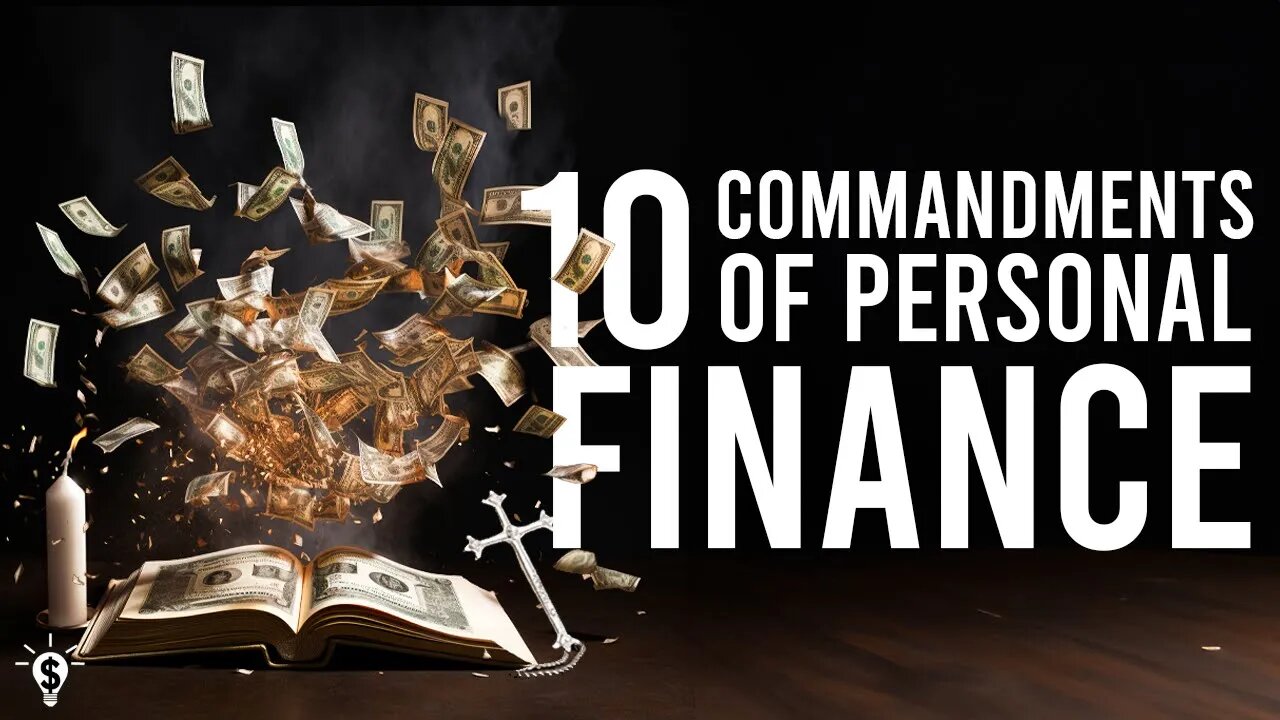Premium Only Content

10 Commandments of Personal Finance
Do you ever feel like financial success is a secret code that only a few have managed to crack? Well, we're here to change that. These ten commandments are not just rules to follow: they're stepping stones on your path to financial success.
Welcome to Financer, your place for business, finance and wealth creation knowledge. In today's episode, we're going to uncover the ten commandments of personal. Lets jump right into it.
Commandment 1: Acknowledge Your Financial Status.
Being honest with yourself about your financial situation is the first crucial step. Whether you're drowning in debt or have a comfortable savings cushion, recognizing where you stand helps you make effective financial decisions. Without knowing your starting point, you won't be able to track your progress or adjust your strategy effectively.
It's quite easy to turn a blind eye to your financial situation, especially if it's not as rosy as you'd like it to be. Start by making a list of all your assets - this includes your income, savings, investments, and any valuable property like a house or car. Next, list out all your liabilities or debts.
This could be student loans, credit card debts, mortgages, or any money you owe. The difference between your total assets and total liabilities is your net worth, giving you a clear picture of your current financial standing.
Simultaneously, start tracking your income and expenses. Maintain a ledger or use a budgeting app if you prefer. Categorize your spending into essentials like housing and food, and non-essentials like entertainment and vacations. This exercise will help you identify spending leaks and areas for improvement.
Lastly, review your financial goals. Are you saving for a house, aiming to pay off debt, or saving for retirement? Knowing where you stand financially will help you make effective decisions to reach these goals faster.
Remember, Financers, acknowledging your financial status is not about inducing guilt or regret over past decisions. It's about gaining a clear perspective on your financial health and leveraging that knowledge to make informed decisions for a secure future."
Commandment 2: Develop a Budget and Stick to It. Now that you have acknowledged your financial status, the next step is to take control of it. One of the most effective tools at your disposal is a budget. A budget, in simple terms, is a plan for your money.
It outlines how much you expect to earn (income) and how much you plan to spend (expenses) over a specific period. This could be weekly, monthly, or annually.
But here's the catch, Financers - a budget is not a set-it-and-forget-it tool. It requires constant monitoring and adjusting. Keep track of your actual income and spending, and compare it with your budget regularly.
If you notice any discrepancies, adjust your budget or your spending habits accordingly.
Let's be real. Sticking to a budget may not be the most exciting task. It could even feel restrictive at times. But think of it as a financial roadmap, guiding you towards your goals. Every dollar you don't overspend is a dollar saved, and in the long run, these savings contribute significantly to building your wealth.
Now Financers, moving on to Commandment 3: Save and Invest Early and Consistently. Here's a fun fact - if you save $200 a month starting at age 25, you'll have amassed more than $300,000 by the time you hit retirement at 65, assuming a 7% annual return. The magic ingredient here is time. So, the earlier and more consistently you start saving and investing, the more substantial your wealth will be.
"Commandment 4: Understand and Leverage the Power of Compound Interest. Albert Einstein once called compound interest the eighth wonder of the world. And he was spot on! Your money earns interest, and that interest earns interest on itself, and this cycle continues, helping your wealth to grow exponentially over time.
Suppose you invest $10,000 in a high-risk, high-return fund that provides an average annual return of 15%. Reinvesting your earnings every year, how much do you think this initial sum could grow to in 30 years? If you do the math, you'd find that it balloons to over $660,000, all thanks to the magic of compounding. "Keep in mind, though, while the potential gains are high, so are the losses with high-risk investments. Always diversify your investments and only invest what you can afford to lose. "The key takeaway here, Financers, is to start investing early and regularly. Even modest amounts can grow significantly over time due to compound interest. But remember, with high returns come high risks. Do your due diligence, diversify, and always stay within your risk tolerance.
-
 2:14:54
2:14:54
TheSaltyCracker
3 hours agoTrump Goes Gangster ReeEEeE Stream 01-26-25
85.1K191 -
 LIVE
LIVE
Due Dissidence
12 hours agoTrump Calls To "CLEAN OUT" Gaza, Swiss ARREST Pro-Palestine Journalist, MAGA's Hollywood Makeover?
2,613 watching -
 2:02:20
2:02:20
Nerdrotic
5 hours ago $1.61 earnedDECLASSIFIED: JFK, MLK UFO Immaculate Constellation Doc | Forbidden Frontier #089
61.1K10 -
 3:00:14
3:00:14
vivafrei
13 hours agoEp. 248: "Bitcoin Jesus" Begs Trump! Rekieta Gets Plea Deal! Pardons, Deportations, Bird Flu & MORE!
125K146 -
 3:44:06
3:44:06
Rising Rhino
11 hours ago $11.89 earnedWashington Commanders Vs Philadelphia Eagles: NFL NFC Championship LIVE Watch Party
56.3K4 -
 13:00
13:00
Exploring With Nug
6 hours ago $1.11 earnedHe Went To Get A Haircut And Vanished WIthout a Trace!
44.1K2 -
 18:53
18:53
DeVory Darkins
1 day ago $8.09 earnedTrump JUST ENDED Mayor Karen Bass During HEATED Meeting
78.4K212 -
 21:06
21:06
Russell Brand
10 hours agoIT'S COMING
134K446 -
 21:26
21:26
Stephen Gardner
1 day ago🔥What JUST leaked out of Congress must be STOPPED NOW!
132K280 -
 53:25
53:25
tether
11 days agoStability and Freedom in Chaos: The Story of Tether USD₮ | Tether Documentary (USDT)
144K5